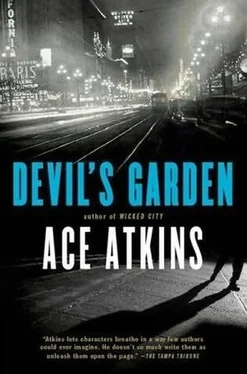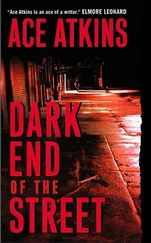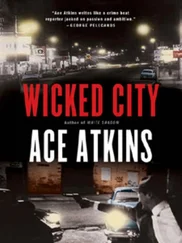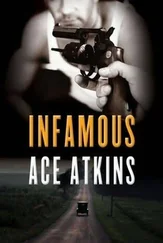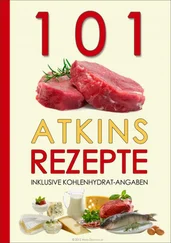
Ace Atkins
Devil’s garden
© 2009
The American public is ardent in its hero worship and quite as ruthless in destroying its idols in any walk of life. It elevates a man more quickly than any nation in the world, and casts him down more quickly-quite often on surmise or a mere hunch.
– ROSCOE ARBUCKLE, 1922
The Arbuckle case was the funniest case I ever worked on. In trying to convict him, everyone framed everybody else.
– DASHIELL HAMMETT, New York Herald Tribune, 1933
July 31, 1917
Anaconda, Montana
He’d shadowed Frank Little for weeks, from El Paso to Butte to Bisbee, and for days now along the wooden sidewalks of the old mining town, built at the base of bleak hills where dusty workers made their way up a crooked path to the foundry and deep down into the earth. They’d started work on the furnace then, and half of the brick phallus rose from the city, towering above the buildings and hills, and would soon smelt the copper they’d sell for twenty-six cents a pound to make pots and newspaper presses.
The town smelled of acrid metal and burnt meat.
Anaconda was open all night. There were saloons and whorehouses and one good hotel and dozens of bad ones, rooming houses where Sam had taken a bed. In the off-hours, when Little would wobble up the staircase and get an hour or two of sleep, Sam would lay on the narrow bed and read the Butte newspapers about a possible war with Germany and a ragged copy of Dangerous Ground, a novel about a Pinkerton he’d had since he was a boy.
It used to be an adventure. Now it was just a reminder.
He’d asked for the room two doors down from Little, where he’d loosened a plank by the stairs so he’d hear a squeak when the union leader went on his rounds. Sam had heard most of the speeches before, Little talking mainly about the country only having two classes, one exploiting the other, and how International Workers of the World wanted to make the fat cats pay for strong backs.
Little said he’d once been arrested for reading the Declaration of Independence on a street corner.
He talked about that mining disaster in Butte in June and how the boys in Anaconda worked under even worse conditions. He called the furnace chimney another ivory tower where the wealthy burned up the common man.
The Pinkerton’s client was supposed to be kept under wraps, but Sam knew it was the Hearst outfit, which owned a piece of pretty much every mine in the country. He was told to tail Little, make notes on the speeches, type out a neat report, and send it back to Baltimore. It was a basic assignment that didn’t need much thought.
The food wasn’t bad. Now and then he could sneak a whiskey at the bars. And two nights ago he’d found a fine, full redheaded whore named Sally who worked overtime off the clock.
Sam heard a creak, put down the copy of Dangerous Ground, noting the Pinkerton standing on the hill shining a beacon of light down on a hooved red devil leading a virtuous woman away, and he followed Little down the stairs through the narrow lobby and out onto Main Street. There were horses and wagons and an automobile or two, the gas lamps burning all the way past the Montana Hotel, down to City Hall and to the dead end of mountain and mine.
Little was up on some wooden crates, talking again, waving his hands wildly to men in overalls and women holding up hand-painted signs. The women looked determined; the men looked scared.
The light was just going down in Anaconda, the shadows on the hills showing purple and black with bright yellow patches. As Sam jotted down some of what Little said, really just repeating a speech he’d heard two weeks ago in Bisbee about those miners shipped off to die in boxcars, he felt a soft hand on his shoulder and turned to see a man dressed in a three-piece black suit holding a gold timepiece in his hand.
“Has a lot of wind, doesn’t he, friend?”
Sam nodded.
The man clicked the gold watch closed and removed a pouch of tobacco from his vest pocket.
“He’s gonna keep going. How ’bout a drink?”
Sam thanked him but said no.
“You’re the Pinkerton, aren’t you? One of them anyway.”
Sam turned back. The man grinned and spit brown tobacco juice on the ground. “Let’s have that drink.”
They found a saloon called Kate’s just off Main Street filled with miners and whores and a back table where a sweaty Chinaman cooked T-bone steaks on an open grill. Sam Hammett, just an edge over twenty but nearly white-headed, leaned back in his seat and put a match to a Fatima cigarette.
The man removed the wad of tobacco from his cheek and tossed it below the table.
Men in the front room had gathered around a piano. A whore was singing “Buffalo Gals,” and the men yelled and thumped their boots on the wooden floors, and in all the action and laughter, Sam and the man were alone.
“I won’t waste time,” he said. “I have a deal to make.”
Sam nodded.
“I’ll put up five hundred dollars over your Pinkerton pay to shut Little’s mouth.”
Sam burned down the cigarette, nearly coughing on the smoke. He watched the man but didn’t say a word.
“That’s not my job.”
“The money all comes from the same place.”
“Hearst?” Sam said, smiling, confident he was right.
“I’m not at liberty.”
“But you are at liberty to hire me out like a goon.”
“Not a goon.”
“Go hire some palooka,” Sam said. “This isn’t my line.”
He stood. The man grabbed his arm, trying to stop him, and tried to crush great wide green bills into Sam’s hand. “I’m not talking about a beating.”
Sam looked down at him, at his jug ears and iron-gray hair and dark complexion, and walked away into the crowd, brushing by a fat whore who grabbed his pecker through his trousers the way some shake hands.
He could breathe on the street, and he walked the wooden planks southward, back toward the emerging smokestack of the mine, and found Little there talking to a dispersing crowd more about the boys in New Mexico, Mexes and Indians and negroes all carted off like animals with no food or water, some of them dying in the boxcars, and then let loose in the desert.
Sam checked his watch.
He made a note.
He followed Little to another bar, where the man drank until the early morning with two burly miners. The man never seeing him. Sam remembering everything he’d learned from his mentor in Baltimore: not to worry about a suspect’s face. Tricks of carriage, ways of wearing clothes, general outline, individual mannerisms-all as seen from the rear-were much more important to the shadow than faces.
But then, outside, he made contact with Little’s eyes and the man noticed him and walked away from two men he was talking to, crossing Main Street, and came over to Sam and simply said, “Don’t I know you, brother?”
Sam shook his head, embarrassed, admonishing himself for being caught.
Little thrust out his hand, well-calloused and warm, and told Sam that it was damn good to meet him, pumping his hand up and down, and left him with a fresh pamphlet from the International Workers of the World asking, WHERE DO YOU STAND?
The men broke up their party in the blackness of a deep night, smoke and steam pumping from the foundries, passing men in leather aprons on the way to work. Tired, pinch-faced women washed laundry in tin buckets while skinny, pasty children played in dry ditches.
Little headed back to the rooming house and Sam followed, waiting five minutes until the man disappeared up the stairs, and then returned to bed.
Читать дальше
